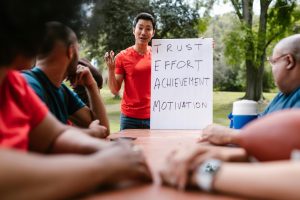The Practice of Leadership
My son started driving on his own this month. As his mother, I naturally hope he’ll stay safe—both for his own sake and for others on the road. When he received his “N” (Novice Driver) license, I reminded him that this isn’t a magical milestone. Getting permission to drive alone doesn’t suddenly make you a better driver.
“You’re out there now, practicing every day,” I told him. “The learning doesn’t stop here. Some days will be tough—especially when the unexpected happens. Other days, it’ll feel effortless, like second nature.”
I think leadership development follows a similar path.
Just because we’ve been given the “license” to lead—a new title, role, or responsibility—doesn’t mean we’re immediately effective leaders. Learning continues. Some days are difficult and stretch us. Other times, we feel deeply aligned with our purpose and proud of the impact we’re making.
Like driving, leadership requires specific skills. Some are foundational—take active listening, for example. We all know it’s important to listen deeply, stay curious, and remain open. But knowing about active listening isn’t the same as doing it well. Skill comes from practice: refining the mechanics, building muscle memory, and appreciating its broader impact on relationships and trust.
Other leadership capabilities evolve over time. Consider how we lead change today. It’s no longer just about following a set of management principles. We’re now called to lead in more dynamic and complex systems, where traditional approaches are being complemented by newer, more adaptive methods—diagnostic and dialogic approaches that emphasize conversation, reflection, and co-creation.
Leadership models and competency frameworks are valuable tools to guide development. In my experience, providing opportunities to practice these foundational and emerging skills—in real-world contexts—is what leads to lasting, meaningful growth.
At Kwela, our leadership development and learning philosophy is rooted in the power of practice. We design experiences where leaders are invited to:
- Reframe challenges and think in new ways,
- Apply tools to real-life situations they’re facing,
- And foster environments where it’s safe to experiment and grow—even through mistakes.
Leadership is a practice. And it develops through practice.
Just like my son will keep building his driving skills—his own unique driving practice—through daily experience on the road, our growth as leaders comes from the same place: the courage to keep showing up, trying, learning, and refining our craft.
What leadership skill are you practicing today?
Kwela offers a variety of management skills training workshops as well as tailored Leadership in Action Programs (LEAP).
Laura Villacrusis, Partner
laurav@kwelaleadership.com


